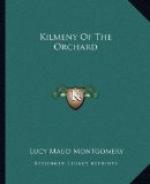The other occupant of the wagon was a man between sixty-five and seventy, with iron-gray hair, a long, full, gray beard, a harsh-featured face, and deep-set hazel eyes under bushy, bristling brows. He was evidently tall, with a spare, ungainly figure, and stooping shoulders. His mouth was close-lipped and relentless, and did not look as if it had ever smiled. Indeed, the idea of smiling could not be connected with this man—it was utterly incongruous. Yet there was nothing repellent about his face; and there was something in it that compelled Eric’s attention.
He rather prided himself on being a student of physiognomy, and he felt quite sure that this man was no ordinary Lindsay farmer of the genial, garrulous type with which he was familiar.
Long after the old wagon, with its oddly assorted pair, had gone lumbering up the hill, Eric found himself thinking of the stern, heavy browed man and the black-eyed, red-lipped boy.
CHAPTER IV. A TEA TABLE CONVERSATION
The Williamson place, where Eric boarded, was on the crest of the succeeding hill. He liked it as well as Larry West had prophesied that he would. The Williamsons, as well as the rest of the Lindsay people, took it for granted that he was a poor college student working his way through as Larry West had been doing. Eric did not disturb this belief, although he said nothing to contribute to it.
The Williamsons were at tea in the kitchen when Eric went in. Mrs. Williamson was the “saint in spectacles and calico” which Larry West had termed her. Eric liked her greatly. She was a slight, gray-haired woman, with a thin, sweet, high-bred face, deeply lined with the records of outlived pain. She talked little as a rule; but, in the pungent country phrase she never spoke but she said something. The one thing that constantly puzzled Eric was how such a woman ever came to marry Robert Williamson.
She smiled in a motherly fashion at Eric, as he hung his hat on the white-washed wall and took his place at the table. Outside of the window behind him was a birch grove which, in the westering sun, was a tremulous splendour, with a sea of undergrowth wavered into golden billows by every passing wind.
Old Robert Williamson sat opposite him, on a bench. He was a small, lean old man, half lost in loose clothes that seemed far too large for him. When he spoke his voice was as thin and squeaky as he appeared to be himself.




